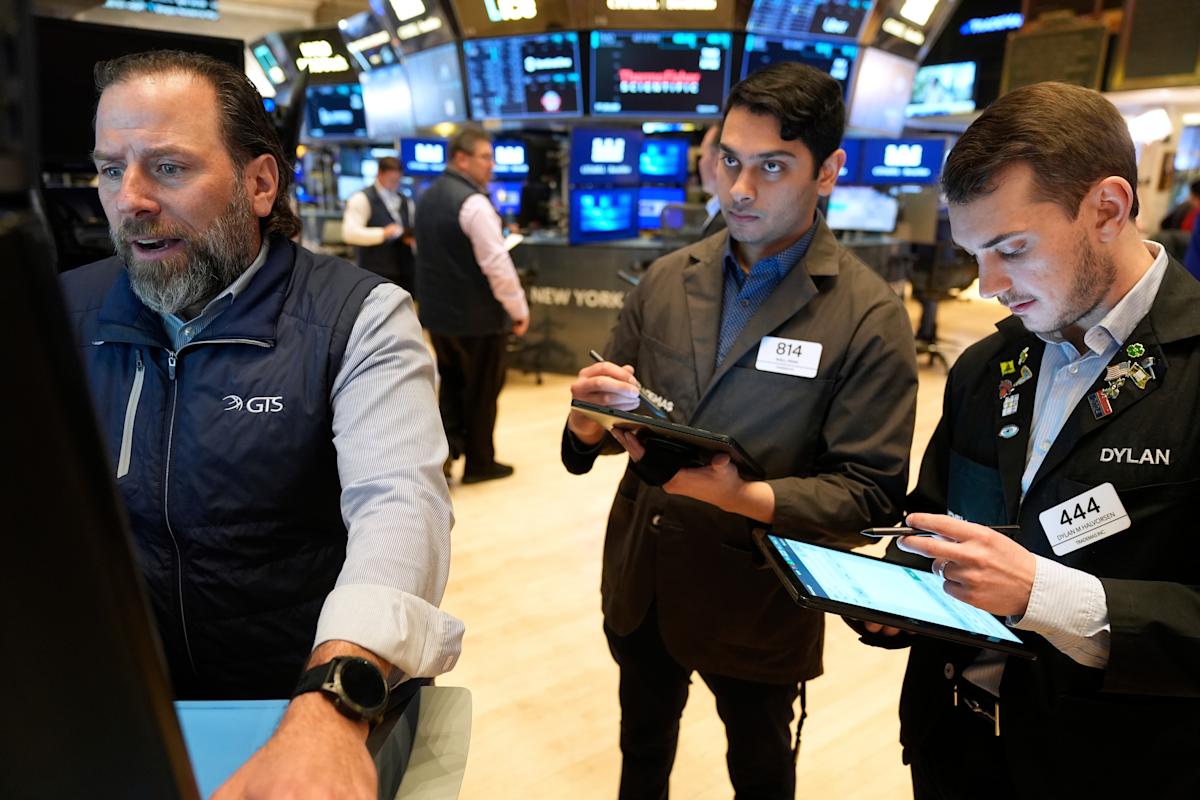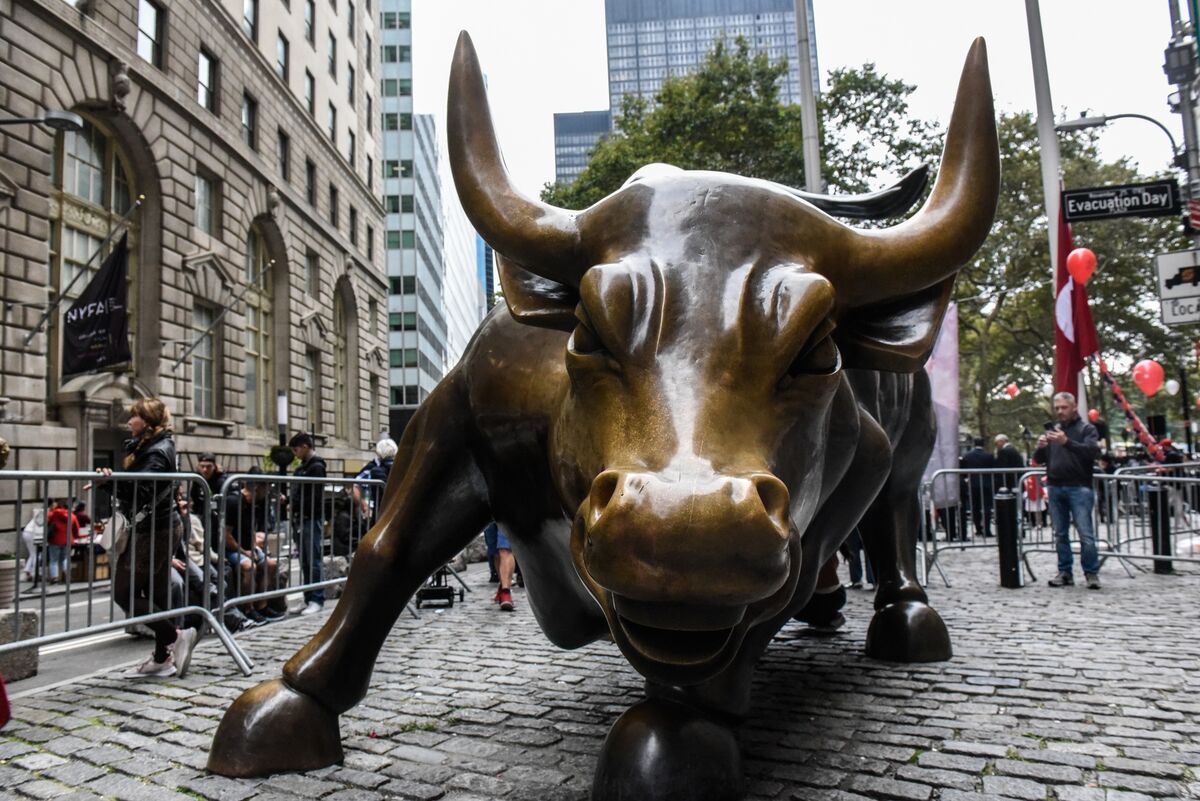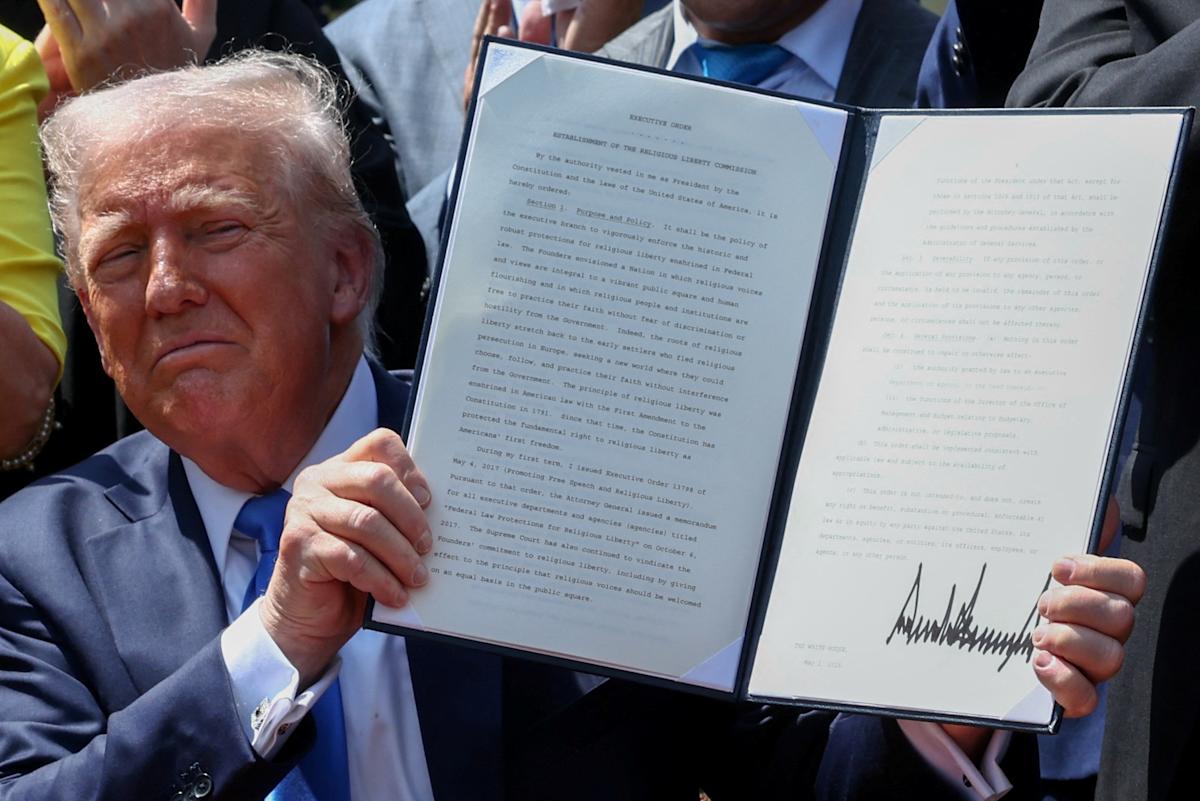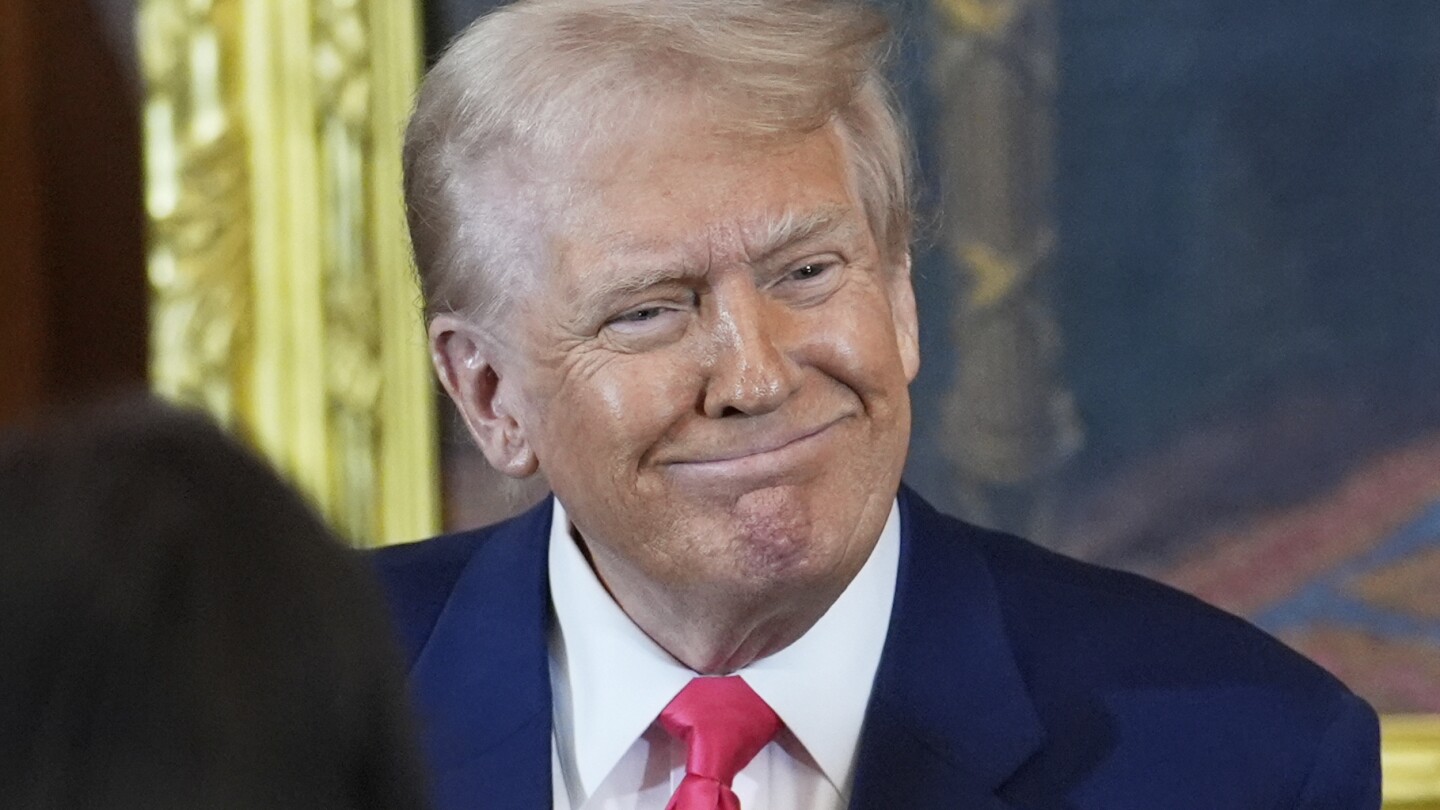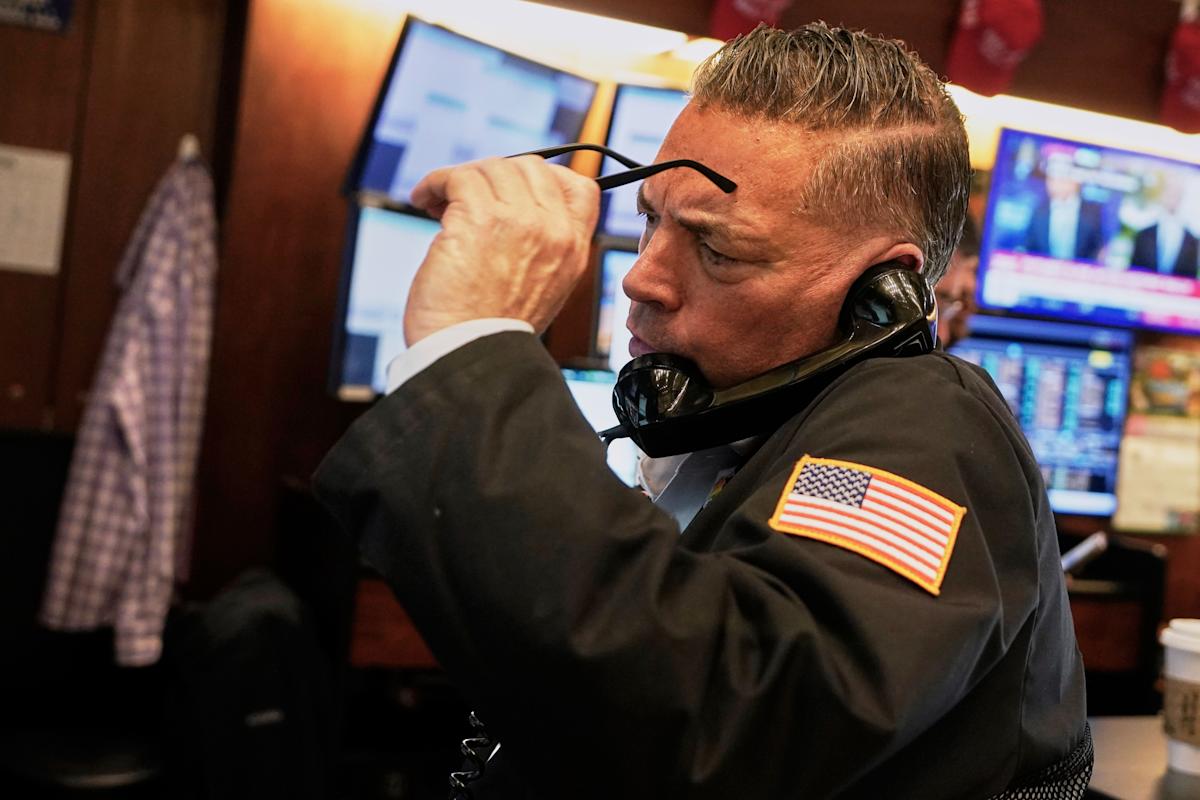Updated 2 min read
In This Article:
US stocks were a mixed bag early Wednesday as Wall Street assessed the prospects for trade war after China struck back with an 84% tariff on US goods.
The benchmark S&P 500 (^GSPC) fell about 0.3%, while the tech-heavy Nasdaq Composite (^IXIC) was up 0.4%. The Dow Jones Industrial Average (^DJI) slid 0.5% or more than 200 points. All three of the major averages were off their session lows.
Meanwhile, the benchmark 10-year Treasury yield (^TNX) continued a recent surge, moving up near 4.5% before paring those gains. The 10-year has seen its largest three-day jump since 2001.
China retaliated on Wednesday after the Trump administration delivered on its threat to impose whopping 104% duties on its exports to the US. After a delay in responding that markets hoped showed signs of restraint, Beijing said the hike to 84% duties will take effect on Thursday, reports said.
The move marks another escalation in the tensions between the world’s two biggest trading powers, which has roiled markets as worries about the fallout for economies worldwide. On Tuesday, China vowed to “fight to the end,” a retaliatory stance that the White House described as “a mistake.”
SNP – Free Realtime Quote USD
As of 11:22:40 AM EDT. Market Open.
^GSPC ^DJI ^IXIC
Trump’s announcement of so-called “reciprocal” tariffs stunned markets last week, imposing massive hikes on Vietnam, Japan, India, and others. They continued to bring chaos to Wall Street on Tuesday in another roller-coaster ride of a session that brought the S&P 500 (^GSPC) closer to a bear market.
Read more: Live updates on Trump tariffs fallout
Investors took in some other signs of optimism, after Treasury Secretary Scott Bessent said he believed “we can end up with some good deals.” Japan and South Korea are in line for trade talks.
For his part, Trump weighed in on the volatile market action just after the open on Wednesday, writing on social media that it is a “great time to buy!!!”
“BE COOL! Everything is going to work out well. The USA will be bigger and better than ever before!” he added.
Meanwhile, minutes from the Federal Reserve’s March meeting could show how worried policymakers were about stagflation risks from Trump’s tariff push. The release due later sets the stage for Thursday’s update on the Consumer Price Index, which will signal where inflation was headed before Trump’s tariffs went into full force.
LIVE 20 updates
-
JPMorgan’s Dimon says US recession now a ‘likely outcome’
Yahoo Finance’s David Hollerith reports:
JPMorgan Chase (JPM) CEO Jamie Dimon called a US recession a “likely outcome” amid the turmoil triggered by President Trump’s tariffs and warned that a negative market reaction to trade policies “could get worse if we don’t make some progress.”
The boss of the largest US bank went a step further than how he described the ultimate economic outcome in his annual shareholder letter Monday, where he stopped short of predicting a recession even as he noted tariffs could lead to both short-term inflation and slower growth.
When asked Wednesday on Fox Business Network’s “Mornings with Maria” if he expects a recession, Dimon said “I am going to defer to my company, but I think probably that’s a likely outcome.”
-
Economist says the US economy is headed for a ‘brief recession,’ and it’s not all about Trump’s tariffs
Another economist believes the economic turmoil spawned from President Trump’s tariffs will push an already slowing US economy into recession.
“We are going into a recession,” Renaissance Macro head of economics Neil Dutta wrote in a note on Wednesday. “I don’t think it is especially controversial to say so. I suspect it will be relatively brief, but that the recovery off the lows will be pretty sluggish.”
Dutta listed tightening financial conditions, reduced government spending, and further escalation of the trade war as potential headwinds to economic growth. Last week, JPMorgan became the first Wall Street bank to call for a recession in 2025 following Trump’s tariff announcements.
In an interview with Yahoo Finance on Tuesday, Dutta highlighted that the recovery for the economy and the stock market won’t look like the V-shaped snapback seen in 2020.
He likened the slowdown he anticipates to the early 2000s recession, where a slowing economy was met by various exogenous shocks, including 9/11. This results in a “slog” of a recovery, per Dutta.
Dutta was early in calling out that economic data had been slowing prior to Trump taking office. He pointed to specific economic data points, like the employment rate of “prime age” workers ages 25-54 declining half a percentage point in the past six months.
“Go back in history and look at what that implies for recession,” Dutta told Yahoo Finance. “It’s very rare outside of recession.”
Dutta argued that outside of the tariff story, metrics like an unemployment rate hovering at 4% have masked a labor market that’s already deteriorating. The quits and hiring rates were already near decade lows, reflecting a low-churn labor market.
For the final months of 2024, the debate in the economic community had been about how long the labor market could hold on thin ice with slowing hiring and limited turnover. In the end, it appears the impact of Trump’s tariffs could be the final straw that turns the data for the worse.
“[Trump] didn’t have as much of an economic buffer as people think,” Dutta said.
-
Trump says ‘it’s a great time to buy’
Just minutes after the stock market opened, President Trump posted on Truth Social “THIS IS A GREAT TIME TO BUY!!!”
Before sending that message Trump had also posted “BE COOL! Everything is going to work out well. The USA will be bigger and better than ever before!”
Trump’s tweets come as an escalating trade war has gripped markets. Most recently, China said it will raise its tariff on US goods to 84%. This comes in response to the US initiating 104% duties on China early Wednesday.
Initially the tariff announcements had weighed on equity market futures, pointing to another bleak open for stocks. But in early trading, both the Nasdaq Composite (^IXIC) and S&P 500 (^GSPC) were higher. The Nasdaq was up about 1.2% while the S&P 500 was up 0.2%.
-
EU approves tariffs on $23 billion of US goods in response to Trump’s metal duties
-
Tech attempts a comeback
After two straight days of the market seeing green at some point in the day only to later close in the red, perhaps the third time is the charm.
The Nasdaq Composite (^IXIC) is up about 0.8% in early trading with the S&P 500 (^GSPC) hovering just above the flat line.
In individual movers, Apple (AAPL), Nvidia (NVDA), Broadcom (AVGO) and Tesla (TSLA) were all up 3% or more. Below is a look at the Nasdaq 100 (^NDX).
-
Stocks open mixed
After futures tied to the major indexes pointed to a lower open for most of the morning, US stocks were a mixed bag in early trading on Wednesday as Wall Street assessed the prospects for trade war after China struck back with an 84% tariff on US goods.
The benchmark S&P 500 (^GSPC) fell about 0.1%, while the tech-heavy Nasdaq Composite (^IXIC) rose over 0.5%. The Dow Jones Industrial Average (^DJI) fell 0.4%, shedding just over 150 points.
SNP – Free Realtime Quote USD
As of 11:22:40 AM EDT. Market Open.
^GSPC ^DJI ^IXIC
-
Bessent downplays bond sell-off, warns China
Treasury Secretary Scott Bessent, who has made the Treasury markets a key focus of his early tenure, downplayed a recent sell-off in the bond market and said China’s retaliatory tariffs were “unfortunate.”
“There’s one of these deleveraging convulsions that’s going on right now in the markets,” Bessent said on Fox Business, via Bloomberg. “It’s in the fixed-income market. There are some very large leverage players who are experiencing losses, that are having to deleverage.”
And on China:
-
Stocks have lost the only ‘silver lining’ of Trump’s tariff policy as sell-off extends
The stock market sell-off has a new headwind. The 10-year Treasury yield (^TNX) has ripped higher adding nearly 50 basis points in the past three sessions. This marked the largest jump over a three-day period since 2001.
And as has been the case over the past two years, a rapid mover higher in rates has weighed on investor’s equity sentiment.
“It’s definitely a new negative development that really kills the only silver lining that this [market sell-off] story had, which was that, hey, at least rates are falling,” Piper Sandler chief investment strategist Michael Kantrowitz said.
Typically one would expect rates to fall, as they initially did on the “Liberation Day” tariff announcement, as investors seek a flight to safety trade as markets price in fears of an economic slowdown. But for a variety of reasons, that’s not happening right now.
And for stock investors it creates one clear takeaway. This market sell-off now has another driver outside of Trump tariff headlines to keep an eye on.
“It kind of creates this new variable that could add to the volatility during during the day, when there’s not headline news,” Kantrowitz said while also noting regular scheduled Treasury auctions could now be stock market moving events.
He added, “Really simply, interest rates going up at a time where there’s clearly a growth scare and a recession scare and a great deal of uncertainty is just bad news period.”
-
Pharmaceutical stocks plunge after Trump says sectoral tariffs coming ‘very shortly’
Pharmaceutical stocks were under pressure Wednesday morning after President Trump disclosed that pharma tariffs are coming soon.
“We are going to be announcing very shortly a major tariff on pharmaceuticals,” Trump said Tuesday at a fundraising gala, per Bloomberg. Trump did not provide further details on the potential duties, but he has previously called for more US drug manufacturing.
Here’s how shares of major pharmaceutical companies around the world were trading at last check:
-
A diminished ‘Magnificent 7’ tests Big Tech’s role in the market
-
Stock futures tumble as China strikes back with 84% tariffs
Futures tied to the major stock indexes are slipping further after China hit back again with 84% tariffs on US goods.
Futures tied to the S&P 500 (ES=F) and Dow Jones Industrial Average (YM=F) slid more than 2.2%. Contracts on the tech-heavy Nasdaq 100 (NQ=F) dropped 2%.
China’s finance ministry announced that it will raise its tariff on US goods to 84%, retaliating to the hefty 104% tariffs on its imports that kicked in on Wednesday.
China’s latest duties will take effect on Thursday as the trade war between the US and China heats up. Earlier this week, President Trump proved unyielding on tariffs while China vowed to “fight to the end.”
-
Oil tumbles 5% China announces additional tariffs on US
Oil tumbled as much as 6% on Wednesday morning as a full-blown trade war between the US and China escalated to new levels, with each country imposing higher tariffs on the other.
West Texas Intermediate (CL=F) tumbled to less than $55 per barrel while Brent (BZ=F), the international benchmark, declined below $60 per barrel.
Traders hit the sell button after China announced it would implement 84% tariffs on US-made goods just hours after the US imposed 104% levies on Chinese-made imports.
Oil has tumbled more than more than 20% since President Trump announced sweeping retaliatory tariffs on US trading partners, including China, the biggest import of crude.
-
Long-term yields soar once again as investors grapple with bond chaos
It’s been one of the most chaotic stretches for US markets in recent memory. And the massive surge in long-term Treasury yields has served as yet another example of the bizarre trading action in the aftermath of President Trump’s tariff-fueled “Liberation Day.”
The 10-year yield (^TNX) jumped another 10 basis points early Wednesday to trade around 4.34% after Trump’s sweeping reciprocal tariffs went into effect. Since Monday, that represents a massive 47 basis point swing from Monday’s low of 3.87%.
Similarly, the 30-year yield (^TYX) jumped another 15 basis points Wednesday, once again extending gains after it logged its biggest move to the upside since March 2020. Prior to Wednesday’s open, the 30-year yield traded at 4.89%.
“We have seen a slowdown in a pretty dramatic reversal in Treasuries in recent days,” Mark Newton, Fundstrat Global Advisors managing director and head of technical strategy, told Yahoo Finance in an interview on Tuesday. “My take is that it’s going to prove short lived. I don’t see any real catalyst for why yields are going to escalate that dramatically.”
Although there’s the potential for yields to move higher over the coming weeks, Newton said he expects the 10-year to steadily decline between now and the fall before eventually hitting 3.5%.
“It doesn’t have to necessarily be because of growth falling apart,” he added. “It could be because inflation is really starting to come down much more quickly than people anticipate.”
On Wednesday, HSBC also kept its 3.5% forecast for the 10-year yield, writing in a research note, “Our scenario analysis supports a further decline in yields to year-end, while valuations are being pulled in conflicting directions by concerns over the policy outlook.”
-
Delta stock rises after earnings beat, CEO says tariff uncertainty is ‘unprecedented’
Delta Air Lines (DAL) stock rose more than 3% premarket after the airline reported its first quarter results. Delta’s CEO Ed Bastian sounded a note of caution on the forward outlook due to global trade uncertainty but laid out a plan to maintain financial stability.
Yahoo Finance’s Brad Smith reports:
-
Good morning. Here’s what’s happening today.
-
Apple rebounds as Trump’s super-sized China tariffs kick in
Apple’s (AAPL) stock rose more than 1% in premarket trading on Wednesday after the a 104% levy on Chinese imports into the US took effect.
Yahoo Finance’s Daniel Howley reports:
-
China stocks bounce back as traders bet on fresh stimulus
Chinese stocks rose for a second day, swimming against the tide of pullbacks elsewhere, as investors bet on Beijing stepping in with stimulus to protect China’s economy from US tariffs.
The Hang Seng China Enterprises Index (^HSCE) closed 1.4% higher, having dropped over 4% earlier in the Wednesday session. The closely watched Hong Kong gauge of Chinese stocks includes the likes of Alibaba (BABA, 9988.HK) and Lenovo (0992.HK, LNVGY).
Meanwhile, the CSI 300 (000300.SS) Index in Shanghai posted a 1% closing gain.
Bloomberg reports:
-
European stocks resume sell-off as Trump’s tariffs go into effect
European stocks fell on Wednesday as President Donald Trump’s tariffs took effect, triggering a sell-off in stocks.
Bloomberg News reports
-
Asian markets continue to fall with new tariffs imminent
Asian stock has slid in early moves, preparing for the impact of mammoth US tariffs coming into effect Wednesday. A 104% tariff on China has rocked the international boat as markets remain uncertain while reacting to the news.
Associated Press reports:
-
Oil closes below $60 for first time since 2021
Oil dropped to close below $60 a barrel for the first time since 2021. Prices have fallen since President Donald Trump’s escalation of the ongoing trade war with China sparked fears about the health of global demand.
Bloomberg reports:

